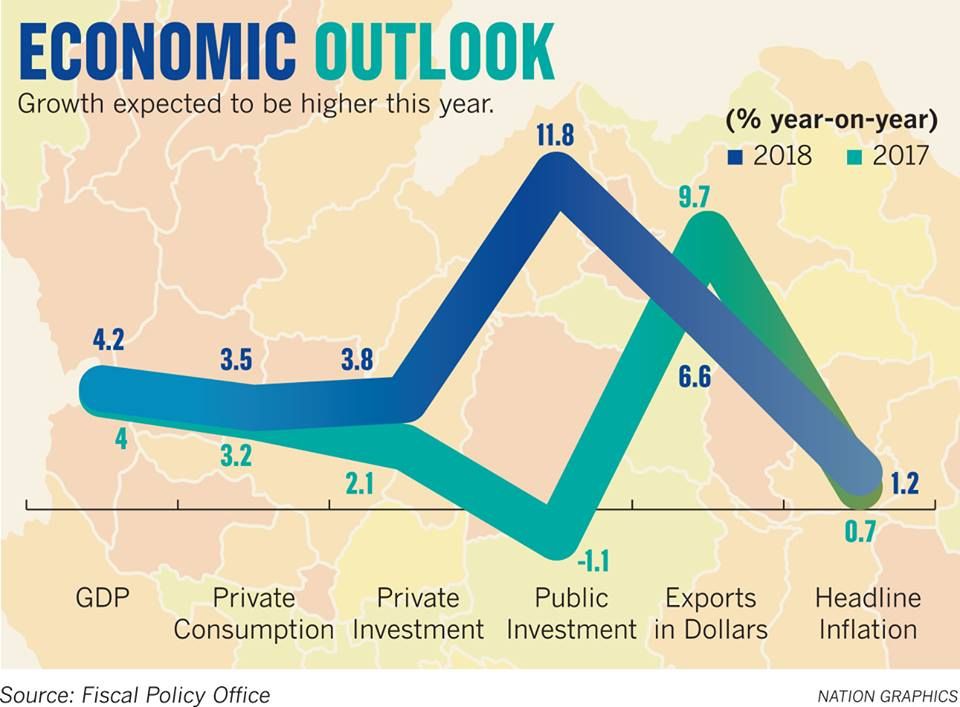Thailand: Economic growth to continue this year
THAILAND’S Finance Ministry has projected higher economic growth for this year, predicting a growth rate of 4.2 per cent and upgrading its economic forecast to 4 per cent for 2017.
In its monthly and quarterly economic reports, the Fiscal Policy Office yesterday revised upward its forecast for last year’s growth rate to 4 per cent, up from the previous 3.8 per cent, due largely to a rise in exports and tourism.
The FPO also forecast expansion of the gross domestic product (GDP) by 4.2 per cent this year driven by investment, consumption and exports.

Finance Ministry spokesperson Kulaya Tantitemit said the economy will be largely driven by public investments, which are expected to increase 11.8 per cent this year, soaring from a contraction of 1.1 per cent last year. Governments have initiated many infrastructure projects for this year, with state enterprises also planning to invest Bt390 billion.
Moreover, the government has also injected a mid-year budget of Bt150 billion to reform the farm sector, said Kulaya, who is also inspector general at the Finance Ministry.
Investors had more confidence in the economy despite the likely 90-day election delay, she said. The ministry predicted private investment will accelerate expansion at 3.8 per cent this year, up from 2.1 per cent last year. Private consumption is expected to rise 3.5 per cent, slightly up from 3.2 per cent last year partly due to a rise in daily minimum wages.
The number of foreign tourists is expected to rise 8 per cent to 38.2 million, up from 35.4 million last year. Visitors are expected to spend Bt2.05 trillion during their stays in Thailand this year, up from Bt1.82 trillion last year.
Thai exports are also expected to benefit from the continued recovery of trading partners.
Export growth, however, would decelerate to 6.6 per cent growth in dollar terms, compared with a growth rate of 9.7 per cent last year. And import growth would also decelerate to 7.1 per cent, compared with 14.7 per cent last year. A stronger baht would encourage more imports, predicted to expand at 8.6 per cent, compared with 14.7 per cent last year. Inflation is expected to be higher this year, where headline inflation is expected to rise to 1.2 per cent, up from 0.7 per cent last year. Rising crude oil prices would impact inflation as the average oil price in Dubai is expected at $61.50 (Bt1,932.61) per barrel.
The country is expected to have a current account surplus worth $45.5 billion (nearly Bt1.43 trillion), equivalent to 9.1 per cent of GDP.
The market is expecting that the ongoing current account surplus will continue to strengthen the baht against the US dollar. The stronger baht will hurt the farm sector as well as exporters because as it erodes the competitiveness of Thai products.
In a related development, economic activities in December last year continued to expand as measured by some economic indicators, said the Finance Ministry. Deputy director general of the Fiscal Policy Office, Varothai Kosolpisitkul, said that the collection of the value-added tax rose 5.9 per cent last month, and car sales rose 40.7 per cent, for expansion over 12 consecutive months. This suggests vibrating of consumption, he said.
Sale of commercial cars rose 9.5 per cent and sale of one-tonne pickup trucks increased 8.4 per cent, suggesting rising private investment.
The Price Index of construction materials increased 3 per cent in December and rose 3.6 per cent in the fourth quarter last year, due to public investment projects and private investment in the property sector.
The regional economy also expanded in December and in the last quarter of 2017, led by eastern, central and southern regions driven by private consumption and investment, Varothai added.
Source: http://www.nationmultimedia.com/detail/Economy/30337459


 Thailand
Thailand




